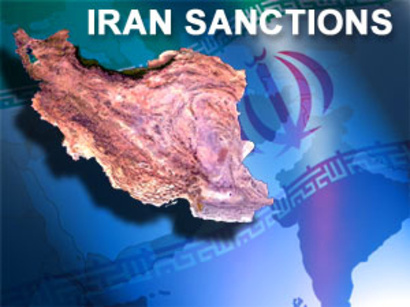U.S. imposes sanctions on some companies over co-op with Iranian tanker company

By Sara Rajabova
The United States imposed new unilateral financial sanctions on some companies on Thursday, also on a Greek businessman, saying it secretly operated a shipping network on behalf of the Iranian government to get around international sanctions on the country's sale of oil, Reuters reported.
"Today, we are lifting the veil on an intricate Iranian scheme that was designed to evade international oil sanctions," U.S. Treasury Undersecretary for Terrorism and Financial Intelligence David Cohen said in a statement.
The sanctions cited Dimitris Cambis and a number of front companies for buying tankers on behalf of the National Iranian Tanker Company (NITC), barred U.S. citizens from doing business with them and froze any of their assets under U.S. jurisdiction.
Greece also ordered a probe into an unnamed foreign company to see if its license to operate in the country should be revoked over its involvement in the shipping network.
The U.S. also imposed sanctions on Kish Protection and Indemnity Club (Kish P&I) and Bimeh Markazi-Central Insurance of Iran (CII) for providing the insurance or resumption of insurance for NITC. The U.S. also imposed a visa ban on members of the executive management of Impire Shipping, Kish P&I and CII, the statement of the U.S. State Department spokeswoman Victoria Nuland said.
NITC is the largest tanker operator in the Middle East and the fourth largest in the world. The company is engaged in the export of oil to world markets, has the contracts with major companies (Royal Dutch Shell, Total) and carries about 11 million tons of oil annually.
Sanctions halved Iran's oil exports in 2012 by more than 1 million barrels a day, about the amount that oil production grew in the United States during that time, and Washington has been at pains to keep up the pressure.
"We will continue to expose deceptive Iranian practices, and to sanction those individuals and entities who participate in these schemes," Cohen said.
The targeted network bought and operated eight tankers, each able to carry roughly $200 million of oil per shipment, the Treasury Department said.
"These operations are conducted through a series of ship-to-ship transfers in an attempt to mask the fact that the true origin of the oil is from Iran and to introduce it into the global market as if it were non-Iranian oil," Treasury said.
However, Iranian Oil Minister Rostam Qasemi said that the advances in the country's oil sector have rendered ineffective the illegal US-engineered sanctions imposed on Iran.
"Breakthroughs, increase in production and efforts by those active in the oil sectors, indicate the ineffectiveness of the enemies sanctions," Qasemi said on Thursday.
He added that the hegemonic system and the Western countries, whose economic conditions are deteriorating, are the main losers of the anti-Iran oil embargoes.
He further said that the government has comprehensive plans on its agenda to reduce the country's dependence on oil revenues.
The plans include stopping the sale of crude oil and instead focusing on oil processing, he added.
Earlier, President Mahmoud Ahmadinejad said that Iran aims to reach the point where it would no longer need to export its crude oil.
"We (Iran) plan to get to the point where we would not need to export crude oil anymore. The number of our oil refineries should double in this case, and it would be of great benefit to our country," Ahmadinejad said on Thursday.
Ahmadinejad further called on the Iranian oil industry officials to make their utmost efforts to design and build fully indigenous refineries.
Here we are to serve you with news right now. It does not cost much, but worth your attention.
Choose to support open, independent, quality journalism and subscribe on a monthly basis.
By subscribing to our online newspaper, you can have full digital access to all news, analysis, and much more.
You can also follow AzerNEWS on Twitter @AzerNewsAz or Facebook @AzerNewsNewspaper
Thank you!
